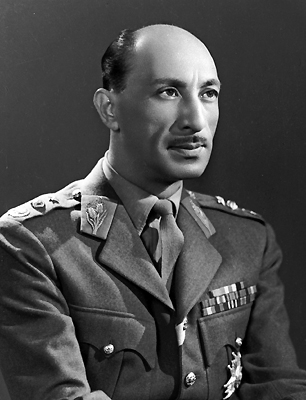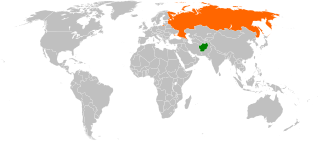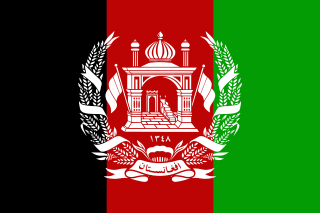
European influence in Afghanistan has been present in the country since the Victorian era, when the competing imperial powers of Britain and Russia contested for control over Afghanistan as part of the Great Game.

Mohammad Zahir Shah was the last king of Afghanistan, reigning from 8 November 1933 until he was deposed on 17 July 1973. Ruling for 40 years, Zahir Shah was the longest-serving ruler of Afghanistan since the foundation of the Durrani Empire in the 18th century.

The Islamic Republic of Pakistan emerged as an independent country through the partition of India in August 1947 and was admitted as a United Nations member state in September 1947. It is currently the second-largest country within the Muslim world in terms of population, and is also the only Muslim-majority country in possession of nuclear weapons. De facto, the country shares direct land borders with India, Iran, Afghanistan, and China.

Mohammad Daoud Khan was an Afghan military officer and politician who served as prime minister of Afghanistan from 1953 to 1963 and, as leader of the 1973 Afghan coup d'état which overthrew the monarchy, served as the first president of Afghanistan from 1973 until his assassination in the Saur Revolution.

Patrick Jay Hurley was an American politician and diplomat. He was the United States Secretary of War from 1929 to 1933, but is best remembered for being Ambassador to China in 1945, during which he was instrumental in getting Joseph Stilwell recalled from China and replaced with the more diplomatic General Albert Coady Wedemeyer. A man of humble origins, Hurley's lack of what was considered to be a proper ambassadorial demeanor and mode of social interaction made professional diplomats scornful of him. He came to share pre-eminent army strategist Wedemeyer's view that the Chinese Communists could be defeated and America ought to commit to doing so even if it meant backing the Kuomintang and Chiang Kai-shek to the hilt. Frustrated, Hurley resigned as Ambassador to China in 1945, publicised his concerns about high-ranking members of the State Department, and alleged they believed that the Chinese Communists were not totalitarians and that America's priority was to avoid allying with a losing side in the civil war.
The following lists events that happened during 1922 in Afghanistan.
The following lists events that happened during 1925 in Afghanistan.
The following lists events that happened during 1942 in Afghanistan.
The following lists events that happened during 1955 in Afghanistan.
The following lists events that happened during 1957 in Afghanistan.
The following lists events that happened during 1964 in Afghanistan.
The following lists events that happened during 1970 in Afghanistan.

Relations between Afghanistan and Germany date back to the late 19th century and have historically been strong. 100 years of "friendship" were celebrated in 2016, with the Afghan President calling it a "historical relationship".

Relations between Afghanistan and Russia first emerged in the 19th century. At the time they were placed in the context of "The Great Game", Russian–British confrontations over Afghanistan from 1840 to 1907. The Soviet Union was the first country to establish diplomatic relations with Afghanistan following the Third Anglo-Afghan War in 1919. On 28 February 1921, Afghanistan and the Soviet Russia signed a Friendship Treaty. The Soviet Union intervened in Afghanistan against the Basmachi movement in 1929 and 1930.

The Kingdom of Afghanistan was a monarchy in Central Asia that was established in 1926 as a successor state to the Emirate of Afghanistan. It was proclaimed by its first king, Amanullah Khan, seven years after he acceded to the throne. The monarchy ended in the 1973 Afghan coup d'état.

The Embassy of the Islamic Emirate of Afghanistan in New Delhi is the diplomatic mission of the Afghanistan to India. The chancery is located at 5/50-F Shantipath in Chanakyapuri of New Delhi. In addition to the embassy, Afghanistan also has a consulate general in Mumbai and Hyderabad.

Mohammad Nadir Shah was King of Afghanistan from 15 October 1929 until his assassination in November 1933. Previously, he served as Minister of War, Afghan Ambassador to France, and as a general in the Royal Afghan Army. He and his son Mohammad Zahir Shah, who succeeded him, are part of the Musahiban.

The Taliban has ruled Afghanistan as the Islamic Emirate of Afghanistan since taking control by force in 2021, overthrowing the internationally recognized Islamic Republic of Afghanistan. The takeover was widely criticized by the international community, and no countries have extended de jure diplomatic recognition to the new regime, despite nominally maintaining relations with Afghanistan. The Taliban has campaigned for international recognition since the takeover. Several countries have vowed never to recognize the Islamic Emirate, and others have said they will do so only if human rights in the country are respected. Some countries have accredited Taliban diplomats at the chargé d'affaires level despite not recognizing the Islamic Emirate. In September 2023, the People's Republic of China became the first country to formally name a new ambassador to the country since the takeover, and in January 2024 recognized the Taliban's envoy to China; however, the PRC still does not formally recognize the Taliban as the legitimate government of Afghanistan. The United Arab Emirates also accepted a Taliban appointed diplomat as Afghanistan's new ambassador in August 2024.

Afghanistan–Vietnam relations refers to the diplomatic relations between Afghanistan and Vietnam.












